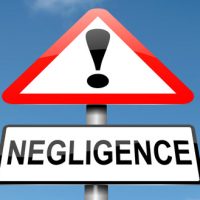New Tort Reform Law In Florida Changes Negligence Standard

When it comes to personal injury cases, courts have long held that an accident victim’s actions can affect how much he or she can recover in compensatory damages. Each state, however, typically adheres to its own standard when determining at what point a person will be barred from recovery. Prior to the recent changes, Florida followed a pure comparative negligence system. The new law, however, requires adherence to a different standard, known as modified comparative negligence.
Joint and Several Liability Standard
In 1986, Florida became a pure comparative negligence jurisdiction, abolishing the doctrine of joint and several liability in personal injury cases. This system allowed juries to apportion a percentage of fault to a defendant, which was then followed by a monetary judgment that reflected that percentage. Under the doctrine of joint and several liability, therefore, a defendant was held responsible for his or her own percentage of fault for causing an accident. The adoption of a pure comparative negligence standard shifted the focus to a plaintiff’s actions and how they affected his or her damages.
Pure Comparative Negligence Standard
Under a pure comparative negligence standard, a person who was injured in an accident, but who contributed in some way to that accident, could still expect to recover damages. The recoverable amount would, however, be reduced by how much that person contributed to the injury in question. If, for example, a car accident victim was found by a jury to have been ten percent at fault for a crash and to have sustained $100,000 in damages, then that person’s award could be reduced to $90,000. Under this system, injured parties could always recover some portion of their losses from a defendant. Until the passage of the new tort reform bill, Florida adhered to a pure comparative negligence standard when awarding damages.
Modified Comparative Negligence Standard
Under a pure comparative negligence standard, an accident victim is never barred from recovery, even if he or she was mostly at fault for an accident. That person can, however, expect his or her damages to be reduced and may also be required to compensate other parties for any negligent actions. A modified comparative negligence standard, however, bars claimants from recovery if they are more than 50 percent at fault for an accident. The only exception to the new standard applies in cases that involve medical negligence.
Call Boone & Davis Today for Legal Help
The recent changes to tort law in Florida will affect anyone whose accident occurred after March 23rd of this year, when the bill became law. To learn more about the modified comparative negligence standard and how its adoption could affect your own rights to compensation, feel free to call 954-566-9919 and set up a meeting with one of the dedicated Florida personal injury lawyers at Boone & Davis today. Being injured in an accident through no fault of your own can be painful and stressful, leaving victims unsure of their legal rights and options. We can help guide you through Florida’s complex civil legal process while you focus on your recovery.
Sources:
flsenate.gov/Session/Bill/2023/837/?Tab=BillText
nbcmiami.com/news/local/gov-desantis-expected-to-sign-floridas-tort-reform-bill-into-law-but-how-could-it-impact-you/2997956/
